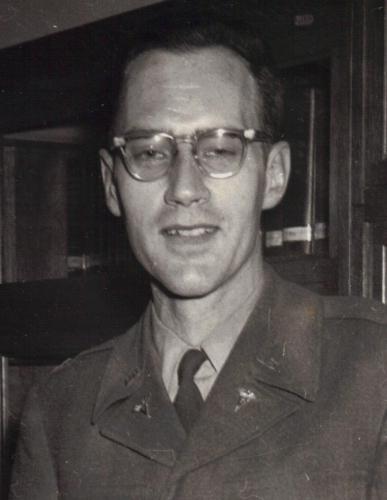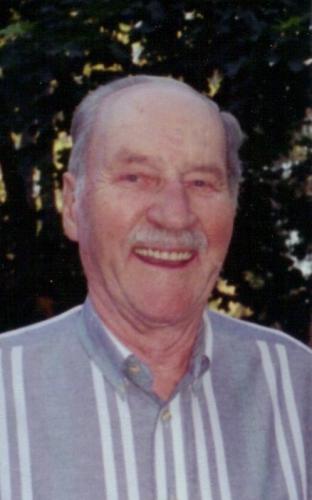Veteran Keith Peterson
Keith Peterson
Keith brings to us not only a fresh view of the past, but also a refreshing view of of the old west. A one room school house, riding a horse to school daily, life on a ranch of wind-swept North Dakota; he's been there and done that. And like most of the old westerners, Keith is a straight shooter in his personal life.
He was born in Gowrie, Iowa on July 15, 1922, the son of a World War I veteran. He did not have any siblings and his mother was ill with heart trouble the last ten years of her life, so he and his dad were often alone together. His mother died when Keith was 15. At his age five they moved to North Dakota where his dad had homesteaded. It was five miles from Montana and two miles from Canada. It was there that he lived for the next eight years, riding a horse to his one room school in the summer, and skiing to the school in the winter. When not in school, he spent his time trapping coyotes, badgers, skunks, and weasels and skinning them and selling their hides; helping his dad on his ranch; and playing with his nearest neighboring kids who lived a mile and half away.

Keith loved that ranch, riding his horse out to feed the sheep, milking the cows; he has a picture of himself at about age eight standing on a huge rock where buffalo used to go to rub their backs. Then in 1936 his dad lost the ranch partly because of the continuing depression, but mainly because of drought. When they had gone there in 1927, the place had been lush with grass a foot high, but when they left, it was a virtual dust-bowl. He remembers them driving away in their pick-up with their belongings; a jack rabbit jumped up ahead of them and began running across the prairie leaving dust trailing behind. They were bound for the State of Washington.
They settled in the small town Vothell near Seattle, and there he attended high school, finishing in 1939. After graduation, he worked in the back room of Safeway in Seattle for a couple of weeks but quit because his net earnings after room and board was only $5.00 weekly. His dad got him a grueling job with a lumber company with much better pay, felling trees and piling them. The job attracted Keith because he wanted to buy a car. But his dad had another purpose; he wanted Keith to attend college. The logging work brought about the desired affect; Keith enrolled that fall in Washington State College.
WW II began on Dec 7, 1941 while he was at Washington State, and he joined the army's Veterinarian Corps Reserve with the rank of 2nd Lt. while he continued his education In 1943 the veterinary school began a full year program as the military decided there was a need for more veterinarians. One could remain a civilian or go into the army as a private and remain in college. Because he needed his summer earnings to go back to college in the fall, he and many of his classmates elected to go to Fort Lewis to enter the army, then back to the campus. In 1944, as the war was winding down, he was offered the choice to stay in the army and be transferred to a medical unit, or take a discharge and go back to the draft board. He decided that since his veterinary degree was only a year away, he would take the discharge.

He graduated from college on Monday, took State Boards on Tuesday, Wednesday and Thursday; and on Friday he married another graduate, Dorothy Schwab. He took work under another veterinarian who said he was thinking of retiring and would hand the business over to him, but after two years the man showed no sign of retiring, so Keith started out on his own as a meat inspector for the Department of Agriculture. In 1952, because of the war in Korea, he was called back into the army and given the rank of Captain. He wound up at the Boston Army Base in charge of inspecting food that companies under contract furnished the military. Many, and disheartening, are the stories Keith could tell of people who tried to cheat the army on military contracts.
Leaving the army in 1954, he renewed his work as a meat inspector with the U. S. Department of Agriculture. He began this work in Ogden, Utah, then to Green Bay, Wisconsin, then to Denver, then to Los Angelos. He was in each of these places about two years. In 1961 he was sent to Washington, D. C. and he retired from there in 1980 as Chief Staff Officer.
Keith and Dorothy have five children; Nancy, Greg, Doug, Kristin, and Connie. Their children live in Virginia except for Kristin who lives in Texas and Doug who lives in Idaho.
We are indebted to Keith for his service in the army, and for his caution in keeping food safe not only for our soldiers, but also for many other Americans as well.
As told to Dick Young